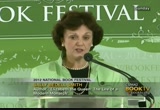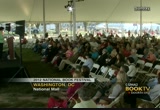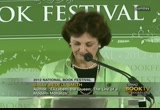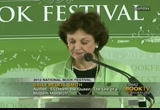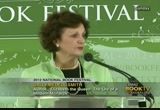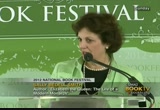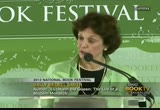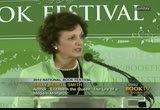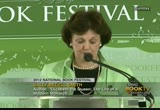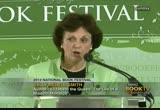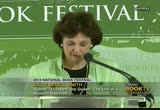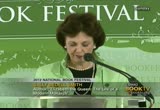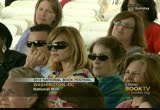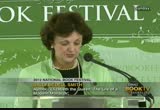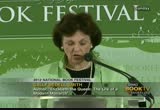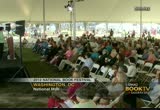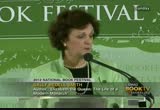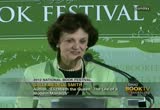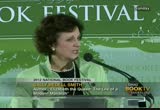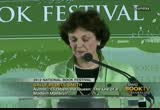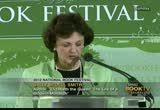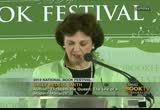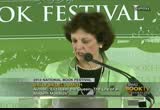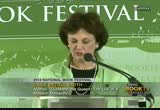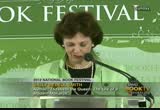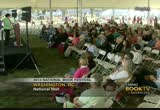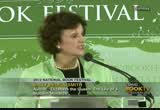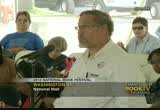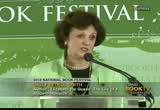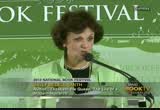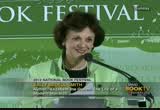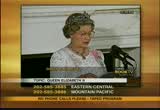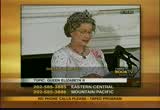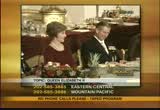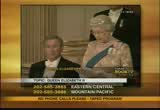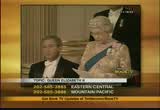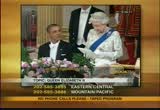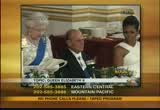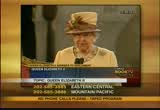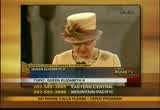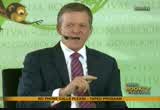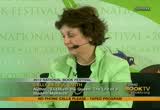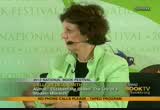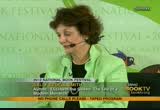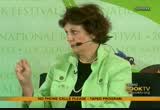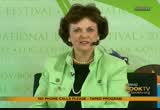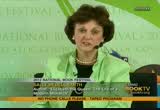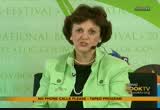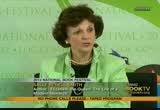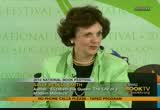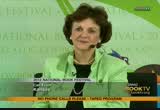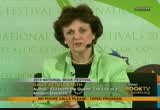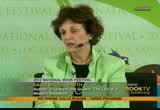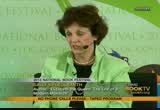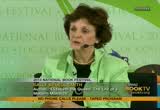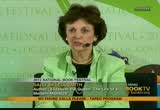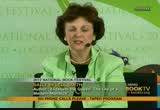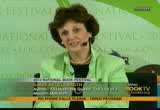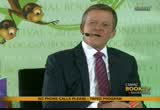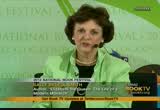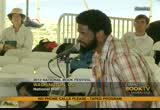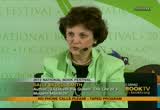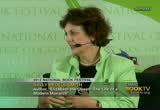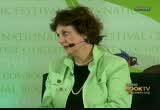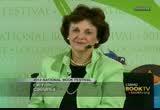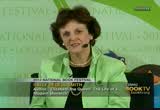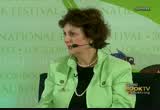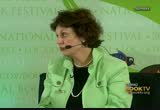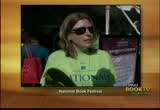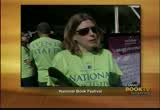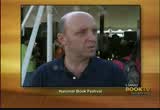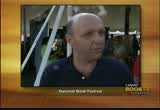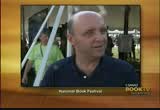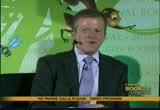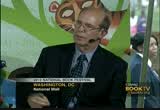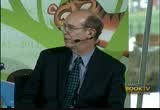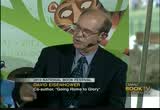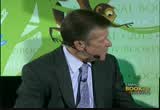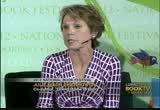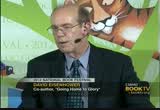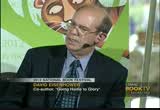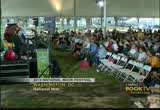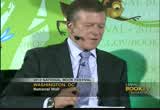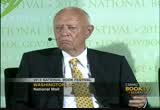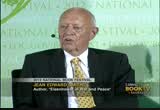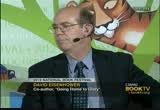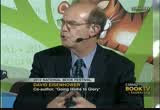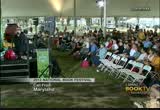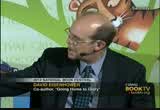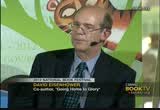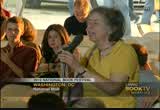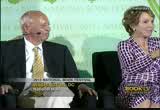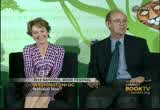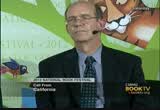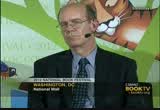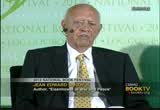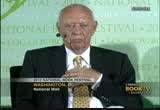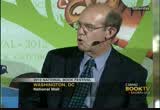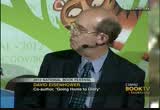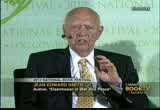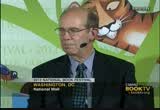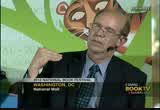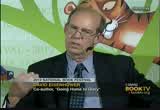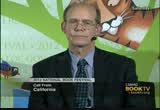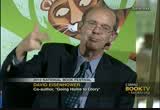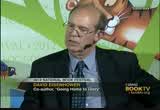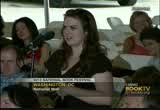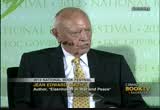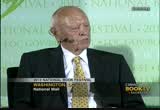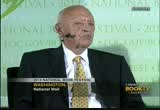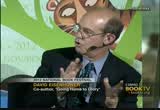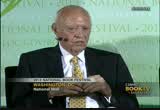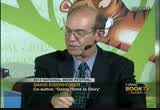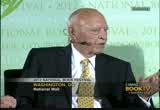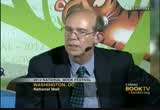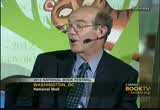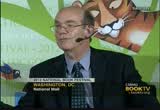tv Book TV CSPAN September 24, 2012 6:00am-8:00am EDT
7:00 am
>> "elizabeth the queen" is the book. we are at the book festival in washington, d.c., and jeff in sidney, montana, you're on the air. >> caller: i just wonder if the queen acknowledges that the base of her bloodline is anglo-saxon? basically german. >> well, it definitely, she's not, she has a lot of german heritage. there's no doubt about that. her family began with george the i who was descended from so for the electorate of hanover and kim of an 18th century. and it continued when queen victoria married, married prince albert from germany. but there obviously is an english restraint that goes through it as well. her mother, the queen mother,
7:01 am
was from the strathmore family, and english scottish family, so it's a mix but you're right, there is a significant german lineage there. it was a problem actually write around the time of, right before world war i when the family name was very germanic. her grandfather, king george v, changed the names of all the people so all the members of the royal family so they were less germanic. other names were replaced for their german counterparts. >> next question. another one from the audience. >> thank you so much for coming. i would like to a something related to you doing your research for biographies. when you do the research how important is it for you to the
7:02 am
old your questions to the person you're going to interview beforehand so they can prepare their answers, as opposed to asking questions that they don't know about and get what some would say the more natural response? >> i always do the latter. i prepare a great deal for my interviews and have long list of questions. but i think it's more valuable to have that kind of spontaneous exchange. in some instances i will, if people feel they can speak more freely, i will give them the opportunity to speak on background, with a provision that later on i can ask them if certain questions or certain answers can go on the record, which is fairly routine. but i think, i think it just makes for better give-and-take
7:03 am
when you have questions that people respond to in the moment. >> now, trend 13, in reading your book maybe i'm reading too much into this but did you talk with the queen in crafting your book? >> well, the queen has a policy that is probably sensible from her standpoint, which is that in her entire 16 year reign she is never given an interview. and that is helped probably to preserve her mystique there and it's kept her from having to pick and choose who she might give interviews to. i was lucky to meet her three times in private social settings. and i described her three times in the book. and each of them was brief but revelatory. and in each case it gave me little glimpses of that private
7:04 am
site, that gaiety of spirit, the flash of wit. and so they were very valuable to me. and i also watched her a lot in different settings. i traveled with her overseas. i traveled with her around the uk. so i could see how she interacted with people. so in addition to intervene people there were lots of other ways i developed my sense of who she is and how she goes about her job. >> was she a where you were writing this book? >> she was, yes, she was where. i initially approached the palace when i got the assignment from random house, and wrote a very polite letter and got a very polite letter back saying we appreciate your interest, there are lots of people interested in running about the queen. we have a hard time choosing somebody. but fortunately i had a group of
7:05 am
people who have helped me enormously with the diana book, some of them had worked for her. some of them were her relatives, and they became my advocates and went to her senior officials at buckingham palace and suggest, she's an american, but she's got a body of work that shows that she writes fair and balanced books and it will be a serious book. it will be a thorough book. so after about six months they briefed her, her press people briefed her and she gave them permission to give me their cooperation, which was very helpful. >> pamela, orange, california, good afternoon. >> caller: good afternoon. just a pleasure to be able to see and hear ms. smith, and i have enjoyed her entire body of work, but especially this seminal research that she has done on this fabulous figure in our lives.
7:06 am
and i think she's pretty much answered my question which was going to be how did she, was she able to interview and get access to the people surrounding the queen and get all of her questions answered. i just want to thank you so much for filling in the background on this wonderful figure in our lifetimes, ms. smith. >> thank you. what was most fun was the range of people i was able to talk to. and again, the help of buckingham palace was very valuable, because i would get in touch with some of her close friends who were naturally a little nervous about possibly speaking and they would call the palace and the palace would say, we are helping her, you know, and use your own judgment, decide what you are comfortable with. so i got to talk to people who really knew her well, and relatives and dog trainers and people who ran for the states --
7:07 am
ran her estates, the manager a first step farm, her horse trainers. it was portrait painters, crown jewelers. obviously, politicians who knew her, members of the clergy. so what i love like a book like this is getting many angles of vision to some quite intimate, some people who sort of have very focused, intense, you know, like the portrait artist, for example, who spent, you become a kind of very informal time with her, saw a whole different view of prevent other people. >> finally, sally bedell smith, why do we care about the royal family like we do? >> well, they are an extraordinary institution, but buying is written together through their continuity, their connection to british history. and today, really they play,
7:08 am
there's a term which is not terribly good but they call it the welfare monarchy. the queen and all the members of her family spend so much time supporting charities, contributing their names and their efforts and, you know, they reward people for good works, and they set an example of service. and the queen of course has the extraordinary advisory capacity. they are, you know, she has led an exemplary life. she is the light above politics. she is one of the most highly respected leaders in the world. she has done all kinds of things behind the scenes to preserve, for example, the commonwealth which is the farmer -- the former british empire which could easily have fallen apart
7:09 am
over issues like a partner. she carries very much about the assignment, about the small nations in the commonwealth that face particular challenges, like the island nations. there's only things that she has contributed to that the british people feel indebted to her for having done. and as i've been going around the country talking to groups, i detected a kind of whistle is almost on the part of people. why don't we have somebody like this who can unify the country, who can be the light above politics? she performs a really valuable service. >> "elizabeth the queen" is the name of the book. sally bedell smith is the author. thank you for joining us on booktv today. thank you all for being here. and that's going to close out our coverage of the 2012 national book festival. thanks for being with us.
7:10 am
>> you're watching the tv on c-span2, 40 hours of nonfiction authors and books every weekend. spent we're here on the national mall in washington, d.c. at the national book festival outside of the library of congress preservation exhibit. can you tell me who and where you're from? >> sure. i work on the digital preservation. we're talking about the first full digital archiving. tell people how to take your other e-mails, their digital photographs that they have, maybe older page that they want to transfer to new formats, and just trying to help people to understand if they want to keep things like their e-mails and photographs, put them away and make sure for 10 years and get them out and look at them again. the technology has changed,
7:11 am
format has changed. >> are you teaching the same technologies that use as well to digitally preserve out of? >> yes. at the library of congress were starting to collect more digital items like websites, data sets, things like that but don't have a printed equal them. so we also have to change the way we convert them. it's a different method. a lot of computer science, paying attention to formats and hardware changes in software changes and managed over time. do it on tape and spinning dis discs. >> what kind of things to digitally preserve in the library of congress because websites is probably the biggest collection where we, we do have a collection of elections. so the current election were having we clicked all the candidates that are running, the presidential and congressional candidates, their websites to
7:12 am
other parties have websites, we collect those but because a lot of time after the collection they can go away. they disappear. future scholars will want to look at those so we do collections around the. we also have a big manuscript collection, and nowadays authors and scientists and people are using computers to create their documents so we're doing a lot of discs, yeah, a lot of older formats like this that we had to figure out how to get the information off and reserve that information. >> can you say your name and where you're from? >> my name is neil carter. i'm from virginia. >> what have you seen today's? >> i brought some students down here today and they're interested in the teens of course but i heard walter isaacson speak about the book from isaac einstein -- albert
7:13 am
einstein. been talking a springboard. been less douglas freely talk about walter cronkite spit what books would you recommend to your students? >> any book is good. as elaborate on any book that inspires somebody that's great. sometimes we lose sight of the classics. the original classic. oak some alternate get my students to read is like brave new world. classics like mark twain, books that deal with racism and slaves that you might not, that they might appear to read mcpherson said this and say this is racist language. what's the message he is trying to say?
7:14 am
we shall paper's other present or maybe a scientist. the library of congress has papers that are wonderful to read. >> do you think there any book should read recently are heard about recently the kind of accurately portray the state of our society and culture and the political system currently? >> not recently. i spoke at a boarding school so you're kind of interested in what they're reading. nothing recently that i can mention politically spend what book are you currently reading right now? >> i'm reading a book about how sad and i do a very interesting story about labor unrest in idaho in the early part of the 19th century. actually the governor of idaho is coming home, ex-governor was coming home to his house and opened the gate and was blown up by a bomb.
7:15 am
a great book. it had to do with clarence darrow. it involves walter johnson is by the greatest pitcher of the early 20th century. it's a great book because it kind of takes anything in idaho and kind of magnify set to show you what's going on in the united states at that time, so that's pretty cool. >> we are back live at theesti e national book festival on the mall in washington, d.c. booktv on c-span2. [applause] and as you can see where the great audience still here in thn history and biography tent. we'rebi joined by jean edward smith, and eisenhowerher and biographer, and, of course, david and julie nixon eisenhower, grandson and granddaughterei in law, and, off course, thought of president nixon. so we are very pleased that o erybody here.we areng t we're going to put the number's up on the screen.
7:16 am
the eisenhower's and mr. smith were talking are there with earl jonathan yardley, so you heard a presenout their presentation. we hav one question for each. where people lined up a linda peeno give everybody a chance.cc i'm just going to get mye out o questions out of theut o way rel fast. jean edward smith, did president eisenhower like campaigning? >> certainly not in 1952. in 1952, this was the new job that he had but he learned it effectively ended 1956, he campaigned. no, he did not like it. >> david eisenhower, in "going home to glory" the book that you and mrs. eisenhower wrote, you said president eisenhower once described you as very able. was that an a+ complement from the president? >> yeah, but the point, the very
7:17 am
able comment, that was his way of complimenting people. kevin mccann was a speechwriter and somebody who helped him write books, including his informal memoir, memoirs, aziz, as somebody who re-created for me, and i, we try to capture that in "going home to glory," the amphion surround our office in gettysburg in the 1960's. people were sitting around and enjoying a quiet morning over coffee and so forth antonette period rusty period rusty brown and dr. mccann picked up a lot of things that delight eisenhower did conversationally and one of the comments they made that really stayed with me and i reproduced it was his highest praise for anybody was to call you able and what he was trying to do was to deflate the
7:18 am
language. he felt that everything was being inflated in the 1960's, our notions of drama on the national level. in fact, a very telling book, a very searching an interesting book on the year 1968 by a trio reddish writers entitled american melodrama. what eisenhower is trying to do and i think he was doing this is as president as well, was to restore a sense of proportion and so being very able. i want to add something to what doctors miss that about campaigning. i spoke to a lot of, spoke to a lot of my grandfather's colleagues over the years including eisenhower's books in one particular was when paul was in theater -- and i interviewed him in oyster bay new york very close to the teddy roosevelt homestead some years ago, and i
7:19 am
asked him that very question. and i think that he would have agreed with your response entirely that delight is in our was not somebody who enjoyed campaigning but he said, the two greatest natural politicians, the two greatest national politicians he had seen in his entire life war al smith and dwight eisenhower. he said these were two people who have a natural talent for it. that is the ability to say the right thing at the right time, to make the gesture and so forth and he had talent for a campaigning. i think that is something that he probably -- he was also older remember. he was in his 60's when he was running so he did not have the energy of richard nixon running in 1960 or obama running in 2008. >> and mrs. eisenhower, lott has been written about your parents
7:20 am
relationship with the eisenhower's. how would you describe it? >> well i think that one of the things i enjoy doing when i was working on the project of eisenhower's retirement years was to look at that relationship and to think about it more and i'm amazed that eisenhower and nixon got along as well as they did because when you think about it, you have two presidents rumbling around together. a president is going to be someone who is very driven. he has an agenda. he has a vision. he knows where he is going so you have dwight eisenhower and then you have richard nixon who in 39 becomes a vice president who already is showing signs that he is on his way so the fact that they got along so well, i mean as well as they get i would say, think is a testament to several things but i think first of all eisenhower made the vice presidency significant. he sent my parents to 53 nations
7:21 am
around the world ambassador's. they were in vietnam in 1953. they were in africa and asia and all over the world and 53 nations because he believed in person-to-person diplomacy still uses vice president i think my father like that. making the vice presidency more than would have been called a warm bowl of spit or -- see what julie was saying is something than mr. smith's book covers as well. this idea that they got along well in spite of their respective circumstances and their abilities. the case in point in the alternative would be eisenhower and macarthur. when you see pictures of eisenhower and macarthur together in his cozy situation in manila, you have a general and then you have a staff aide in the staff it is leaning over respectfully and providing the general was a message that he is
7:22 am
to to approve and so forth and he is all very humble but what i think, they are going to blow up. this is a relationship that's going to blow up and if you look at it in retrospect and you say of course it was going to blow up. the person who commands u.s. forces in except the japanese surrender in tokyo bay and september 1945, this is macarthur the great theater commander and dwight eisenhower commanding the american theater. these are two people who are not naturally supportive -- subordinate relationship. no wonder they blew up, and they did. eisenhower nixon in hindsight, this was mentioned, ambition with an engine that never arrested. and you have to have that be a president, to even be eligible to become a president, to even be within the zone of people who are considered for the presidency so they both have this tremendous inner dynamism
7:23 am
and they were bound to clash and i think what is remarkable is that i think the answer is they were of separate generations. i think they had been contemporaries they would have been -- >> the first call forecast comes from carl in elizabeth, new jersey. carl you are on booktv. please go ahead. >> thank you peter. this is a great privilege. mr. smith's book on eisenhower i got at the library and i am the middle of drafting a letter to david and his father. now that i see the two eisenhower's onstage together, it's going to have a third addressee, mrs. eisenhower as well. i have a -- i also want to say my earliest political memory is my mother saying general eisenhower was nominated at the 52 republican
7:24 am
convention so that gives away what my age might be but i have a serious question concerning how history is recorded regarding the incident of may 1, 1960 and i have reference to mmo of general who was in a two president eisenhower. after checking with the present i informed mr. bissell of the cia that the u2 makar pressure may be undertaken provided it is carried out prior to may 1. that memo and less is written to cover general goodpaster -- suggests that the u2 might not have been authorized by a president president eisenhower but in fact would would have bea rogue operation directed by the director of central intelligence. if anyone can draw on that.
7:25 am
thank you very very much. i appreciate it. >> general goodpaster did not go out on anything. the president approved the u2 flied. there is no question the president approved it as a president regretted approving it but he approved it because the cia insisted on it and he allowed them to have one last flied. of course it was shot down by the soviet union and eyes and are always regretted it. to eisenhower's great credit he did not blame this on mr. dulles or mr. bissell. he took personal responsibility for it even though khrushchev gave him ample opportunity to place the blame on someone else. eisenhower refused to do that and he took his own responsibility for it and he did it -- >> next question comes from here in the audience. hi. >> i had a question about eisenhower's ability to affect
7:26 am
nice talent. i have read that he was quite good at identifying maybe would other people considered hidden talent and i wondered if you could comment about that, if you also found that in your study of him and whether that was a particular trait that he looked for an pupil that allowed him to identify people who might have otherwise been overlooked? >> he had a military career as president eisenhower did. one of the things you learn very early on is how to identify talent. and eisenhower was a superb identifier of talent and i will give you one example. they were very close with president eisenhower. after eisenhower was elected president in november of 1952, he immediately took off to play
7:27 am
golf and let clay and brownell brownell -- because he knew these people and he recognize their talents and their abilities and he understood that they knew more about who should be in the cabinet more than he did at that point because he had been at nato for the previous three years. and so, eisenhower was a superb judge of talent and as they say he learned that through his military career. >> i would say amplifying that, i would say that is probably his most important political contribution as president. dwight eisenhower was a republican and proud of being a republican and he believed in limited government that he was governing in a democratic era. he was governing and the fdr era so what the eisenhower frustration does he is it applies the brakes to overreaching and makes
7:28 am
bipartisan many policies in the new deal but applies the brakes on others but it is not an aggressive administration presenting a republican blueprint in driving for a mandate on policy questions. but the eisenhower frustration did in the 50s however methodically was it recruited talent. it is hard to find a republican presidency that does -- to the eisenhower frustration, george w. bush being the latest actual encumbrance in the white house to acknowledge that. mitt romney who is running, the republican nominee this year's father was identified by eisenhower in the early 60's in michigan and promoted romney's fortune. the idea is that the power of the presidency and control of the executive branch the republican party in the 1950's
7:29 am
have an opportunity to train a whole cadre, thousands of future leaders who would go out or make a difference in the future and i think that is one of the great accomplishments abetted administration. it was early republican administration governing against the new deal tied, governing sensibly, governing in a bipartisan way and getting a lot done and governing well but above all promoting and creating opportunities for people down the road and i think they succeeded really well. see our next question comes from steven right here in civil -- silver springs maryland in the suburbs. high steven. >> caller: i would like to ask particularly david and julie, someone who is writing his own book on president nixon, i would be very interested to find out what if any advice president eisenhower they have given to president nixon on an informal basis about how to conduct the war in vietnam?
7:30 am
>> we talk about it quite extensively in "going home to glory," we discovered an effective cover that in a certain way and i think it was, what happens in late 1967 and attackers is wonderful account the richard nixon wrote that was basically his last business meeting with dwight eisenhower. and what i see here is that by eisenhower was somebody who knew two things and first of all in his era he knew the nature of the soviet communism and he knew america's important than sort of holding up and defending the free world but he also knew that his perspective and his wisdom was generation bound and that the next generation and nixon represented the next generation, would have to make its own evaluation of the situation. i think what nixon was presenting eisenhower and 67 was
7:31 am
for eisenhower probably confusing. what you said about the eisenhower doctrine and that is if you fight a war you mean it, you are going to win. that was not applied in the non. and richard nixon was running for president in 1967 on a platform. he was not promising to obliterate north vietnam or when would plan an all-out total victory. what he was promising to do was send toward. this was a complicated sort of rearrangement and what happens in eisenhower's and richard nixon's final meeting, eisenhower is read the articles and he approves. he thinks he understands and he realizes that he is now older and he will not have the energy to see this, to see this project through and this is why we turn to able people. this is why we turn to energetic leadership and why we regenerate the presidency because nixon was in a position to make the call in 1968 that would have endless
7:32 am
positive international ramifications, ending the war and winning the peace. >> mrs. eisenhower did you want to add anything to that? been the only thing i would add is that last farewell meeting where my father travels to gettysburg, has a copy of foreign affairs in which he says, we need to end this isolation of china and we need to recognize that the united states and china have to move forward together and of course eisenhower -- no recognition of red china has been called but at the end i eisenhower came to agree that it was time for a new shift. see you are watching the tv on c-span2, live coverage of the national book festival. jean edward smith, biographer of president eisenhower and david and julie nixon eisenhower, "going home to glory" about president eisenhower's post-presidency. the next question from here in the audience.
7:33 am
>> the 60's was a tumultuous time and feminism was certainly in the air and i'm wondering, at home on the farm, if president eisenhower had anything to say about these changes and also made me, what was her role in these discussions and what she was she consulted by your grandfather, your grandfather in law and some of these issues and the general eisenhower have anything to say about women in the military as possibilities for them and is course we have seen what has happened over the past decades. >> i just was chained -- exchanging glances with jean. i don't think eisenhower made comments about women in the military. >> hold on. the women's army corps was created. that was during world war ii and eisenhower -- you are right.
7:34 am
see one of my favorite clips is on pbs and the presidential, the american experience. there's a wonderful two-part documentary on dwight eisenhower and one of my favorite clips is eisenhower returning to uniform in 1951 and taking up his nato command and they show him exchanging a salute with a female officer. it is all business. in other words quite eisenhower does not see it as male/female. he is an officer and she is a superior offers are and they are exchanging. it's a very interesting picture selection. dwight eisenhower was somebody who come the closest i can come to that as he gave the commencement address. he was very proud of my sister, my three sisters and there were four of us grandchildren and he addressed the shipley school in the spring of 1967 and he was addressing these hemlines that were going up, the miniskirts. he said remember that ankles are
7:35 am
always neat but needs arise now become something like this. he was not very moderate that he was somebody who loved people, male or female, he loved humanity and that really came through in everything that i experienced around him and i'm talking about the evenings in gettysburg and dinner and gas and so forth. i don't know how he would have formulated a position about feminism but i think the key to human relations in his field was mutual respect and he had tons of relationships like that, male and female. >> the next question, john and woodland hills california, good afternoon. you on booktv. >> caller: thank thank you. good afternoon. let me first say president eisenhower is one of just a handful of presidents for whom the office of presidency was not the greatest accomplishment of his career.
7:36 am
he would have been a historical figure even if he never ran for president for my question concerns the nomination of senator nixon for vice president. reports have stated on tv that eisenhower was approached after he was nominated and they asked who should be vice president he said it's up to the convention and his staff said the convention will vote for whomever you suggest and they recommended senator nixon. that story always seemed to me to be a little insincere. it seems to me there was more to that then met the eye. i think general eisenhower and president eisenhower was very good at appearing less involved than he actually was. and it always seemed to me this was an occasion where he had made the choice and he wanted the responsibility to fall in the staff. since we have people here who
7:37 am
are intimately involved with the eisenhower and nixon families, i wonder what they can say about this appointment or this obligation of senator nixon for vice president. >> professor smith? >> many years ago i had an interview with herbert brownell who is eisenhower's attorney general and really ran eisenhower's presents a campaign and in that interview mr. brownell told me, he said that evening after ike won the nomination in chicago he and lucius clay and the general having dinner at the hotel and mr. brownell said, so i asked the general, general whom you want to be your vice presidential candidate? and he said the general looked at me and he said well, i think mr. smith, at american airlines was an enormously if executive. i think you would be a good vice president and brownell said
7:38 am
lucius and i were sort of rolling our eyes at each other at that point and i rallied and i said general they are all very fine men. i'm sure the convention is going to want to know whom they can recognize. and i'm sure they are going to look to you exclusively for guidance. and so, general nodded his head apparently and mr. brownell then said general if you haven't thought about it very much, lucius and i believe you should go with richard nixon. nixon is young. he was in the navy. he is from california. he is a good record in the house and the senate, and in the house and the president said well, general eisenhower said according to brownell, i think i have met him. i think i have met him. cleared with attack people and epitaph people say okay that's fine. i can't say that is exactly how
7:39 am
it happened but certainly that is what herbert brownell said was a the way it happened in mr. brownell was a key player at that time. >> i think that the first two presidents, vice presidents to be selected with the idea that they would be future presidents, the first two or harry truman in 1944 and there is an argument right now between roosevelt scholars and truman scholars over whether that is the case but based on stories that i've heard growing up, that is pretty true that truman was elected and 44 and the idea that roosevelt would not survive his term. the second was richard nixon in 1952. there is, and i have some personal insight into this, richard nixon in his memoir, recounts how in 1951 he had given an address in the presence of governor thomas thomas dewey and dewey came up to him at the end of the speech and he said, make me a promise senator, don't
7:40 am
get overweight, stay in shape and someday you will be president. i believe governor dewey was the one who is behind brownell and the idea was that nixon would be the political arm of the eisenhower years and he was. nixon had taken on enormous responsibility for keeping the republican party in that period and the reason i think there is a lot to this is that when richard nixon was elected in 68 and julie and i spent so many -- with him and 69 in and 70 and so forth one name that kept coming back and coming up and coming up over and over again and i think this would actually be an interesting article someday documenting the personal relationship based on complete confidence and fondness between richard nixon and thomas dewey. nixon's wanted to name two week foreign successor. he wanted to elevate him to the
7:41 am
supreme court and do he basically said i'm too old. i can do this. he wanted to be secretary of defense. he wanted to be anything in government and this was gratitude that the relationship that was forged without question i think back in a time when thomas dewey identified nixon as a young political person. >> just one thing to both of those comments. i know after my father was nominated and eisenhower and my father met come eisenhower admitted that he didn't realize just quite how young my father was when he made the decision to be the running mate. i don't think he realized him he was 39, so he -- you thought he was 42? >> that's right. 39 years old. >> let me go at back to what david said about governor dewey. that's exactly right. isenhour's campaign for president was run by dewey, brownell and clay but do we is always staying in the background because he had run and 48 and 44
7:42 am
and lost both times and do he remains very much in the background but do he indeed invited nixon to give the keynote address for the link and a address for the republican party in new york in 1952 and at that time nixon went up to the suite afterwards with brownell and was duly and that is when they formed that opinion, that he should be a candidate. >> the next question from right here in the audience at the national book festival. >> hi. this is for david primarily. you talk about him having a mild manner and -- in pennsylvania and toning down the rhetoric and thing things should be on scale and i was wondering if you are any of your sisters if they are listening have any comments on the proposed memorial for washington
7:43 am
d.c.? >> well i think i just heard my sister susan i think was on c-span as we were coming and that i was listening to her comments. all i will say about the memorial commissioner are two things. first is the gratitude or the satisfaction that our family feels bad as many senators and congressman and many distinguished people who served on the eisenhower commission would devote the time and resources and so forth to memorialize them eisenhower and this means a lot to us and second we drove right through that area over the eisenhower memorial is supposed to happen. as we were coming in this afternoon and it was a reminder, it was very close to the capitol landed fact presidential nod girls for tens of hundreds of years to come looking over the shoulder of the president towards the crowd will see the site where the eisenhower memorial is supposed to happen.
7:44 am
i think scene outside was a reminder that this is precious real estate in the district. this is a really important spot and we have got to get it right or going other words the memorial has got to satisfy everybody, the congress that is going to look out on it, the citizens to come who will attend the inaugural ceremony, so i think the commission is made enormous progress. it took 40 years to build an fdr memorial and this has been and business for a little over 10 and it doesn't surprise me that given dwight eisenhower's career which mr. smith covers in such -- this is such an incredible life really, really a career which stands on its own in the presidency and how to do all of that in a single site, probably 500 ways to do it, maybe 1000 ways to do it but it doesn't
7:45 am
surprise me the controversy has arisen over the very designed and i think that will be sorted out. it has to be because this is a beautiful site in washington and the commission and the people responsible will have to get it right. >> we are talking with authors david and julie nixon eisenhower and "going home to glory" is the name of their most recent book and of course jean edward smith, "eisenhower in war and peace" and the next call comes from mike in los angeles. hi i. >> caller: my question is for david. your father was an amazing president, one of the greatest presidents ever to actually serve over our country. but it seems that the republican party has fallen short in recent years. i need looking at the last republican president and his eight year demonstration, looking at where the republican convention is a prime example of the problems that the republican party is having and the current events happening today.
7:46 am
inside the republican party you have the tea party movement which is part me for saying, a joke in itself but where how do you think your rant but it would have viewed the republican party and what would his advice be to republican leaders today? >> both isenhour's on the evolution of the gop and also mr. smith who has interesting views on this. my view of it is to pose that question and the very interesting what what-if, to pose that question is like asking how franken roosevelt would have you the democratic party in the jimmy carter era. in other words, he's the same idea but is being carried forward under dirt different circumstances. in fact a very interesting speech that we studied at the university of pennsylvania is a speech that jimmy carter gave, famous beach. douglas brinkley is here and he is among the authors who has written the best book on present carter, the unfinished
7:47 am
presidency. he gave a speech and the national speech and line that up to the franklin roosevelt first and not girl in 1933, the same values, the same arguments, the same everything with one exception. and that is the role of the american people. in 1933 the american people overwhelmingly ratifying the new deal in the 1970 and the american people have more or less abandoned the new deal and so what you see is a change in circumstances. i think that the gop right now and the vicissitudes have a lot to do with circumstance that i would say in this is going back to the 50s and the depth of the bushes and the republican party, what quite eisenhower did in the selection of vice president, in 1952 being charlie wilson and other businesspeople, he is somebody who greatly admired the private sector of
7:48 am
america and look for ways to delegate the private sector in his era and that is my response. what would you say, jean? >> i think i would assert the -- rule of this point. some of you in the audience may be old enough to remember him. he played first base with the senators back in the 1930s. he was a big role. he could move around very much but he always loved the american league's and one time a newspaper report said how can you possibly leave the american league failed when you are immobile in some respects? i think it's pretty simple. if you don't touch the ball you cannot make an error. so i think i will pass. [laughter] >> he was a heck of a hitter. >> the next question is from our
7:49 am
audience. >> i just finished reading the book that talks about the role of the former presidents helping the current presidents regardless of party and you talked about how eisenhower helped kennedy and nixon and johnson so i'm curious how truman helped eisenhower? >> the question is eisenhower worked for the successors. gouda truman work with -- how did president truman work with -- [inaudible] eisenhower was president of columbia and let's go back before that. in 1945 president truman offered to step down as presidential nominee if eisenhower take the democratic nomination. there was a bit of hero worship in relation to general eisenhower and when it came time to get nato off the ground in 1950 and 1951, eisenhower and
7:50 am
president truman asked eisenhower the big leave the presidency and take leave from columbia and go back to europe to organize nato which general eisenhower did and eisenhower was their when he came back in 1952 to run for the republican nomination so if there was a great respect between the two and one of the reasons truman did not seek a third re-election in 1952 was because ike got the republican nomination. if taffet got the republican nomination truman would have remained as democratic candidate that year so there was a great deal of respect between the two. they sell out during the campaign, during the 1952 campaign. ike was not prepared
7:51 am
house. to have coffee with the president as is customary. he was smarting over some issues during the campaign. and the ride up to the capital was very chilling. he had invited your father back from korea at the time without telling him he one, and general eisenhower took a little offense to that, and there were some other things. but three days later after eisenhower was in the white house he wrote a letter to president truman, far more generous and appreciative about
7:52 am
the truman had facilitated the change over and the transition in this letter. they didn't really see much of each other for the next, oh, dozen years.think they met i think really for the firs first time at the assassinationt funeral of president john kennedy.>> it ththey >> i think they met briefly at l the rayburn funeral and 61 but that's right. esangeme that happens, and again this is going back to this question ofow how a richard nixon would've gotten along with the dwight eisenhower or whatever. i thinkt relations between a successor and a predecessor tend to be frosty, and because of the very nature of executive leadership you come into office and the ideas i'm going to change the world. i see everything that has been done wrong and now we are going to do it it my way so generally a predecessor tends to be your
7:53 am
target and so eisenhower and truman all into that pattern. eisenhower and kennedy to a lesser extent, kennedy and johnson, johnson and nixon much lesser and carter reagan is phenomenal in that way and so on. skeel is a change of parties from democrat to republican that facilitated the changeovers well but kennedy's funeral is where they really got back together. they rode in the same car and i think they got along marvelously with each other. i guess maybe it's talking out of school but they both thought president kennedy's funeral was overdone, that it was too grand and eisenhower and truman said that and so when eisenhower was
7:54 am
buried, this was a very simple funeral but it was deliberate on eisenhower's poor. eisenhower was buried in a g.i. casket, $98. there was no big parade and no morning and they body laid in state in the capitol and went back to abilene. i am sure you were there. >> one more thing about eisenhower and truman and that is i don't think any two presidents have more in common with each other than those two. they were different personalities that one can easily imagine harry truman in the abilene high school yearbook. you might've been wearing big losses and holding a violin or you might've been a piano player but he was a midwestern type in ike was a midwestern type. there was an episode and 52 campaign that i think is amusing and i'm not sure what to think of it but we are talking about an strange men between ike and
7:55 am
truman and ike's bitterness towards truman and truman or less asked him to run for president. about september or so truman goes along the -- and i'm not sure stephenson won them on the hustings and he goes on the charge that he is a snarly costs are. starley guster is apparently a fighting warrior in the midwest and no one else would have any idea what it is but eisenhower and truman would have an i.d. and apparently this is a fighting word. and snarly guster means something like kind of a turncoat. is the idea that ike would work with democrats and now he's running as a republican and so forth. this, truman knew how to get under eisenhower skin and so he did in 1952 and i think that contributed to the very frosty relations. >> david is quite right to point out that truman is from missouri
7:56 am
and very similar but truman began his career working at a bank, working in kansas city. his roommate for the first year was arthur eisenhower, eisenhower's oldest brother. they live together in the same room. the same rooming house. been back there is a document that is in the war papers and i don't know how many historians have seen this one but it was a message in effect being relayed to eisenhower through his older brother from harry truman who was then a senator in missouri and had not been elevated to the vice presidency yet and had and it was about 1943 emma before the political year began. this is from the u.s. senator of missouri to be commander of the european forces, the supreme allied institution of forces. you are the inevitable successor of franklin roosevelt and as it
7:57 am
turns out harry truman finds himself in a role like andrew johnson after the american civil for somebody who has been dropped into this natural succession. >> unfortunately we could probably go for another hour and we'll have 150 questions. we have one minute left. you get 15 seconds of it and we will give our panel is 45. >> david t. recall personally speaking with your grandfather about the normandy invasion in a particular beforehand is concerned about intentional failure or success. >> from a grandchild's perspective and he would know this from a larger perspective, world war ii was the subject that he left alone. as my father put at once, he would accept criticism on
7:58 am
anything regarding his presidency but he could not really bring himself to revisit the controversies of world war ii i think because so much was at stake. when you think of all the lives that depended on the decisions that were made then, and this is reflected in the character of the eisenhower library and even the roosevelt library that covers world war ii and so forth. this is a very somber topic and my grandfather simply would not come he did not want to teach it and he didn't want to go back and relive it in a superficial way. by the same token we were encouraged to learn it so this is the veteran experience and you covered so many clay, grants, what is your reaction there? >> i think david is an authority on this. 25 years ago david wrote the book on eisenhower and i think he has the last word on this. >> i'm going to finish with that. has been an honor to be here with jean edward smith who has written a terrific look.
7:59 am
we are fighting over it and we have been fighting over. this is a rate account of the entire life which is to meet the greatest challenge i can imagine. .. had the heart monitors on, but his spirit was so great, walk in the door and he would always say when are you going to become an eisenhower? [laughter] that made me feel good. it was very nice. >> david and julie nixon eisenhower. jean edward smith. [applause] >> this is a booktv on
182 Views
IN COLLECTIONS
CSPAN2 Television Archive
Television Archive  Television Archive News Search Service
Television Archive News Search Service 
Uploaded by TV Archive on

 Live Music Archive
Live Music Archive Librivox Free Audio
Librivox Free Audio Metropolitan Museum
Metropolitan Museum Cleveland Museum of Art
Cleveland Museum of Art Internet Arcade
Internet Arcade Console Living Room
Console Living Room Books to Borrow
Books to Borrow Open Library
Open Library TV News
TV News Understanding 9/11
Understanding 9/11